The following is from: “ruth weiss and the American Beat movement of the ‘50s and 60’s” by Horst Spandler, published in: ruth weiss, no dancing aloud – lautes tanzen nicht erlaubt. edition exil, Vienna, 2006. – also used as an introduction to ruth weiss’ book can’t stop the beat – THE LIFE AND WORDS OF A BEAT POET. Divine Arts, Studio City, 2011.
ruth weiss’ and Kerouac’s ways crossed in 1955. By then Kerouac had published but one book, The Town and the City (1950). Two more years were to pass until On the Road made him famous. As ruth weiss stresses, they were not lovers – luckily, she believes, because otherwise their relationship would not have been as relaxed as it was. 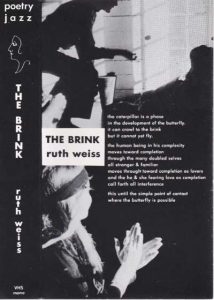 Kerouac’s visits to her place followed a certain routine. He used to show up late at night with a bottle of wine, then they would talk about everything under the sun, about writing stream of consciousness and his technique of sketching with words, i.e. catching moments in a way painters do, which he developed in those years – and they wrote haiku together. Expressing herself in this short form derived from Japanese literature became one of ruth weiss’ long-lasting passions. The poems received a very special note by the water colors she added to them. Jack Kerouac’s collected haiku appeared in 2004. Unfortunately none from this early stage of experimenting with the form are included, because they did not survive. But ruth weiss reports his comments on her poems: “You write better haiku than I do.”
Kerouac’s visits to her place followed a certain routine. He used to show up late at night with a bottle of wine, then they would talk about everything under the sun, about writing stream of consciousness and his technique of sketching with words, i.e. catching moments in a way painters do, which he developed in those years – and they wrote haiku together. Expressing herself in this short form derived from Japanese literature became one of ruth weiss’ long-lasting passions. The poems received a very special note by the water colors she added to them. Jack Kerouac’s collected haiku appeared in 2004. Unfortunately none from this early stage of experimenting with the form are included, because they did not survive. But ruth weiss reports his comments on her poems: “You write better haiku than I do.”
The nightly visits quite regularly ended with Kerouac passing out drunk on the floor, but often sleeping no longer than until sunrise, when Neal Cassady frequently knocked at the door, Kerouac’s friend, whom he immortalized in his novels On the Road and Visions of Cody as the prototype of the Beat hero. Off the three would go on wild Beat style joy rides, pretty much like the ones described in Kerouac’s books, on the serpentine roads of Portrero Hill – rides which ruth weiss remembers not without going goose-pimply, since she believes she owes her life to the fact that so early in the morning there was hardly any oncoming traffic on those blind curves.
That ruth weiss was friends with the surrealist poet Philip Lamantia one usually hears from her in connection with a rather spectacular story she records in Compass, a journal of an extended visit to Mexico. In 1959 she met with two of her friends from San Francisco in Mexico City, Lamantia and the photographer Ann McKeever, and they spontaneously decided to climb the near-by Mayan Pyramid of the Sun in order to watch the sunrise from there. They made it to the top of it, but then her fear of heights paralyzed her to such a degree that she had to be carried all the way down.
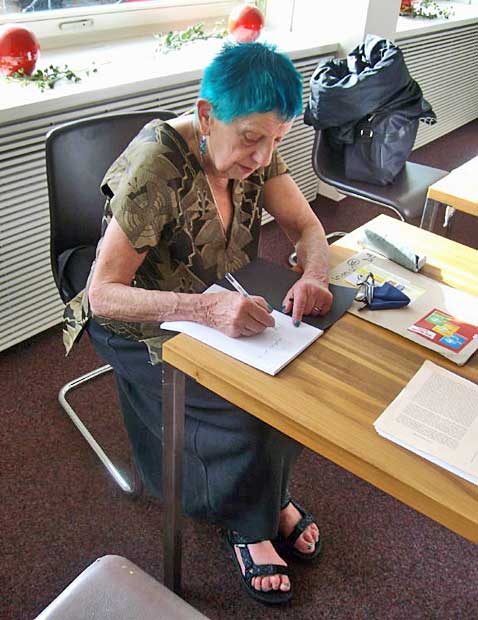
Another anecdote, which she willingly tells in her incomparable way, has grown up around her friendship with street poet Jack Micheline. In 1967 she spent some time in Los Angeles, because she had met the artist Paul Blake, her longtime companion and illustrator of some of her books, and followed him there. On her way to the different bars she used to write in she again and again spied a tall and impressive man, who didn’t appear to be threatening, but nevertheless seemed to stalk her somehow. Years later, back in San Francisco, when she and Paul launched Surprise Voyage, a poetry performance series in the Old Spaghetti Factory, somebody recommended poet Jack Micheline, whom she had not met in person yet up to then. She agreed and was just as surprised as he was when they faced each other. He shouted: “Oh, it’s you! You used to follow me all the time in Los Angeles!” That was the start of a lasting contact in the course of which Micheline bought several pieces of art from Paul Blake, but occasionally he also appeared unexpectedly and urged him and ruth weiss to buy some of his drawings, because he was short of money.
 A long friendly relationship also existed between her and the poet Bob Kaufman, who had already gained some renown in French bohemian circles famed as “the black Rimbaud”. As a Jew with black skin he was predestined to be a social outcast and was a typical street poet, who was present and well-known on the streets and squares as well as in the bars of North Beach. In no way did he crave for literary fame and he did not bother to write down his poems, because he recited them by heart. weiss contributed a number of poems to the now legendary literature magazine Beatitude, edited by Kaufman, which was distributed in mimeographed copies and offered a platform to some of the better known, but also to now long-forgotten writers of the scene. In his book Blows Like a Horn, Preston Whaley dedicated a joint chapter to ruth weiss and Bob Kaufman – first of all, because he views them as typical members of the Beat Generation in San Francisco, but at the same time also as writers who not only wrote from the extreme fringe of society, but both remained underestimated marginal figures of literature for a long time. He recognizes certain affinities in their literary production of that period, namely that they both “displaced and deconstructed the self in order to cross […] the very brink of selfhood” and broke open syntactical structures.
A long friendly relationship also existed between her and the poet Bob Kaufman, who had already gained some renown in French bohemian circles famed as “the black Rimbaud”. As a Jew with black skin he was predestined to be a social outcast and was a typical street poet, who was present and well-known on the streets and squares as well as in the bars of North Beach. In no way did he crave for literary fame and he did not bother to write down his poems, because he recited them by heart. weiss contributed a number of poems to the now legendary literature magazine Beatitude, edited by Kaufman, which was distributed in mimeographed copies and offered a platform to some of the better known, but also to now long-forgotten writers of the scene. In his book Blows Like a Horn, Preston Whaley dedicated a joint chapter to ruth weiss and Bob Kaufman – first of all, because he views them as typical members of the Beat Generation in San Francisco, but at the same time also as writers who not only wrote from the extreme fringe of society, but both remained underestimated marginal figures of literature for a long time. He recognizes certain affinities in their literary production of that period, namely that they both “displaced and deconstructed the self in order to cross […] the very brink of selfhood” and broke open syntactical structures.
— Horst Spandler


POEM FOR RUTH WEISS
she grooves with time
day time, night time
be bop jazz time
dances with timeless time
all rhythm no rhyme
birds in flight flap their wings
copulate with the wind
a magician’s illusion where
time and words move from celibate
to wild orgy
feed off the flesh of the other
pause in roller coaster freeze
stop motion
she sings her song
another day another night
bitch slaps father time
kaufman, son of jazz
in her heart
micheline in her blood
jazz in the Fillmore|
jazz on the Harlem rooftops
full moon rising
with poems that dig into my bones
lubricates the gears of my mind
lost in a haze of motionless motion
RIFF FOR RUTH
For ruth weiss,
“The Beat Generation Goddess”
WHAT MADNESS THIS IS,
TO LIVE FOR ONE LINE OF WORDS
LIKE JOY,
LIKE THE FIRST KISS
AND THEN THE GOODBYE,
LIKE A JAZZ RIFF
STILL ECHOING
LONG AFTER THE CLUB
HAS CLOSED
AND THE CROWD
HAS GONE HOME;
AND NOTHING ELSE EXISTS
BUT THIS RIGHT NOW,
THIS JOY FOREVER.
— Bob Booker

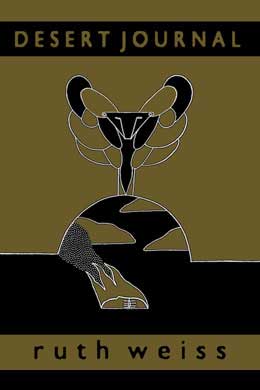





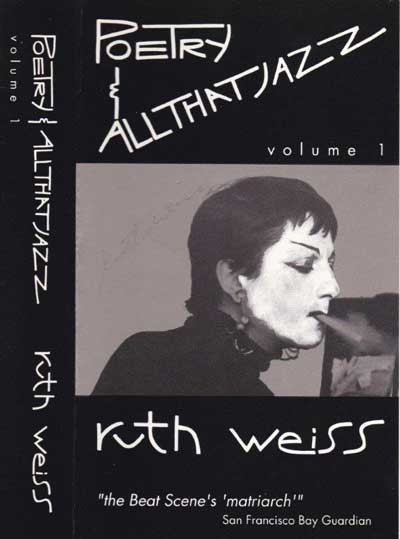

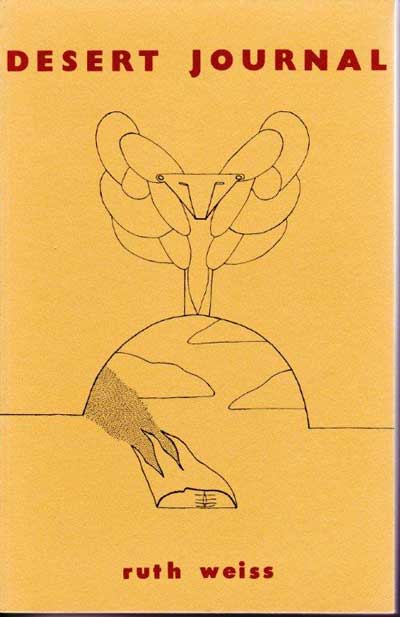


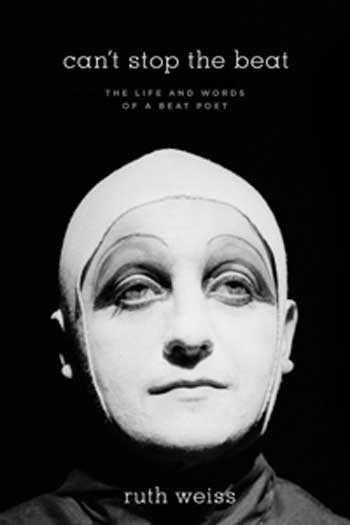





susy zelaya says
I’m sitting here this evening w Thomas who introduced me to you Ruth!
Juliette says
Hello everyone
I am trying to see THE BRINK and I look for people who saw it to give me personal impressions and descriptions of it, as in France it’s impossible to see it ! it’s a very well kept secret here…
I tried to write to the SF cinematheque, then to ruth herself, and I am waiting for an answer now…
If you are interested in my project of collect (it is for a fine arts school project in France) please, write me!
Looking forward to hear from some of you. If you saw The Brink and can tell me about it, can give me your impressions, your memories about this film, please write to [email protected]
:)
thanks!
Juliette
Richard Schaefer says
When did 1984 get set aside? I remember Ruth weiss when she had wondrous visits at claude duval’s evening readings in his San Francisco home. I’m still in sf. Happy for her mother’s day.
A.D. Winans says
I went to the North Beach Focus Gallery event on Monday for the celebration of the 85th birthday of Ruth Weiss. At 77, I have been to a lot of birthday celebrations, but this one was the most vibrant and positive energy one I have been privileged to attend. Neeli Cherkovski i and I met up with her and friends of Ruth before the event. We arrived with Ruth at the galllery at 4 pm. Ruth looked wonderful and read some of her work, including parts of a poem written in 1958, the same year I got out of the military and began hanging out in North Beach. There were to many people there to name, but each one paid her tribute with a poem or words of love for her. A remarkable lady I have known for over 45 years. May she have many more birthdays to come.
Vince Silvaer says
Ruth,
On behalf of my family, we wish you a happy 85th birthday!
I know you have been highly influential to many other artists and a very dear friend to so many.
Best wishes.
Vince Silvaer (Jack Micheline’s son)
Bryn Fortey says
Back when I edited my short lived Beat poetry magazine ‘Outlaw’, ruth was a generous and enthusiastic contributor, (as were so many), and a wonderful conversationalist during transatlantic phone calls. We lost touch many years ago but I have her work, both written and recorded, to keep the flame alive in my heart.
Michael Wiese says
It may be her birthday but ruth is a gift to us. i am always thrilled when i hear that deep, raspy voice that doesn’t identify itself on the phone. she doesn’t have too. i know who it is. We met in 1967 when Steven Arnold and I were filming ruth in MESSAGES MESSAGES, our surrealistic film premiered by Salvador Dali in New York. ruth was amazing and we’ve stayed in touch through all these years. Not long ago I was privileged to publish ruth’s CAN’T STOP THE BEAT – a magnificent collection of unpublished works. I hope someone will call her and read her these comments in celebration of her birthday. I am in Sicily now near Mount Etna as I celebrate life with ruth. Onward and upward, Michael Wiese
Horst Spandler says
Bruce,
I bet you have managed to save a few dimes by now, so why not call her? She still loves to talk on the phone at night.
sloy says
ruth, i admire your words! i’ve long admired your gutsy way to live life to the fullest. but now, on your 85th birthday, i want to say that i admire your style! blue hair/short skirts/short hair/sleeveless tops… you are one all around beautiful broad. thank you for your gifts to us all.
A.D. Winans says
going to an event at an art gallery in her honor today and will read my poem for her. nice tribute here, Denise.
Bruce Hodder says
When I started my own print magazine “Blue Fred’s Kitchen”, ruth weiss was someone I really wanted to have as a contributor. Another poet, probably Bryn Fortey, gave me her land mail address and I sent her a letter asking for poems. Like most people I wrote to, ruth replied quickly. I’m pretty sure she sent at least one poem. She also invited me to call her, specifying that it should be after dark where she was. “I’m a night cat, love to chat,” she wrote. But I’d put every penny I had into getting the magazine out and I couldn’t afford to call. I wish I had. Bryn did after receiving a similar invitation and he said they had a wonderful conversation.